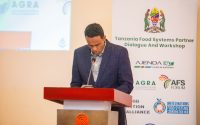Dr. Kalibata Champions Intra-Africa Trade for Improved Food Security at UNGA78
By Kilimokwanza.org team
In a stirring call to action during the 78th United Nations General Assembly’s Food+ Forum, Dr. Agnes Kalibata, President AGRA, emphasized the pressing need for Africa to revamp its food systems.
Dr. Kalibata highlighted a stark reality – intra-Africa trade is a mere 15%, suggesting that the continent largely relies on external sources for its food needs. “Africa does not trade with itself on food. Africa gets food from everywhere else except Africa,” she lamented.
In a world grappling with supply chain disruptions, climate change challenges, and geopolitical tensions, Africa’s self-sufficiency in food production and distribution is not just a matter of sovereignty, but of security and stability.
There lies an untapped reservoir of opportunities for Africa, not only to be self-sustaining but also to bolster its intra-continental trade. Echoing the sentiments of food sustainability proponents, Dr. Kalibata stated, “There exists opportunities for the continent to eat what we produce, and produce what we eat. This is the food systems transformation needed for the continent.”
The Food+ Forum, part of the broader UNGA78 discussions, serves as a platform for policymakers, thought leaders, and stakeholders to discuss and map out strategies for sustainable global food systems. This year’s discussions have heavily gravitated towards recognizing the critical role of intra-regional trade in achieving food security, especially in regions like Africa.
AGRA, under Dr. Kalibata’s leadership, has been at the forefront of various initiatives that promote modern and sustainable farm practices, increase farm yields, and bolster trade among African nations. The clarion call at the UNGA78 further consolidates the organization’s commitment to seeing a transformed African food ecosystem.
With such focused discussions at global forums like the UNGA, the hope is that the continent will pivot towards more self-reliant and sustainable food systems in the coming years. It’s a vision of an Africa that not only feeds itself but also propels itself forward on the world stage.
